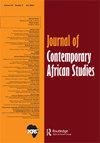津巴布韦反对派未能在选举前组建联盟
IF 0.8
Q2 AREA STUDIES
引用次数: 1
摘要
关于非洲反对党为何经常无法联合起来以优势地位对抗现任政府,文献中一直存在着一个经久不衰的讨论。现存的许多研究都考察了在老牌民主国家选举前建立联盟的成功案例。对于非洲反对党未能组建联合政府的原因,关注较少。为了对这场辩论有所贡献,本文探讨了津巴布韦反对党为何未能在2018年大选前联合起来组建选前联盟。这与文献中的公理相悖,即选举前的联盟在增加反对派在选举中的利害关系方面确实很重要,这与肯尼亚等国家的历史背景是一致的。利用从定性研究中收集的证据,作者认为,由于结构和协调方面的挑战,反对派领导的选举前联盟仍然难以建立,特别是在津巴布韦这样的竞争性威权政权中。本文章由计算机程序翻译,如有差异,请以英文原文为准。
Opposition failures in forming pre-electoral coalitions in Zimbabwe
ABSTRACT There is an enduring discussion in the literature on why African opposition parties often fail to unite to fight the incumbent from a position of strength. Much of the extant studies have examined success stories of pre-electoral coalition-building in established democracies. There is less focus on why African opposition parties fail to form coalitions. In seeking to contribute to this debate, the article examines why Zimbabwean opposition parties failed to coalesce to form a pre-electoral coalition ahead of the 2018 election. This is against the axiom in the literature that pre-electoral coalitions do matter in increasing opposition stakes in elections, as read in line with the historical context of countries like Kenya. Using evidence gleaned from a qualitative study, it is argued that opposition-led pre-electoral coalitions remain uneasy to establish, especially in competitive authoritarian regimes like Zimbabwe, owing to structural and co-ordination challenges.
求助全文
通过发布文献求助,成功后即可免费获取论文全文。
去求助
来源期刊

Journal of Contemporary African Studies
AREA STUDIES-
CiteScore
2.20
自引率
0.00%
发文量
18
期刊介绍:
Journal of Contemporary African Studies (JCAS) is an interdisciplinary journal seeking to promote an African-centred scholarly understanding of societies on the continent and their location within the global political economy. Its scope extends across a wide range of social science and humanities disciplines with topics covered including, but not limited to, culture, development, education, environmental questions, gender, government, labour, land, leadership, political economy politics, social movements, sociology of knowledge and welfare. JCAS welcomes contributions reviewing general trends in the academic literature with a specific focus on debates and developments in Africa as part of a broader aim of contributing towards the development of viable communities of African scholarship. The journal publishes original research articles, book reviews, notes from the field, debates, research reports and occasional review essays. It also publishes special issues and welcomes proposals for new topics. JCAS is published four times a year, in January, April, July and October.
 求助内容:
求助内容: 应助结果提醒方式:
应助结果提醒方式:


